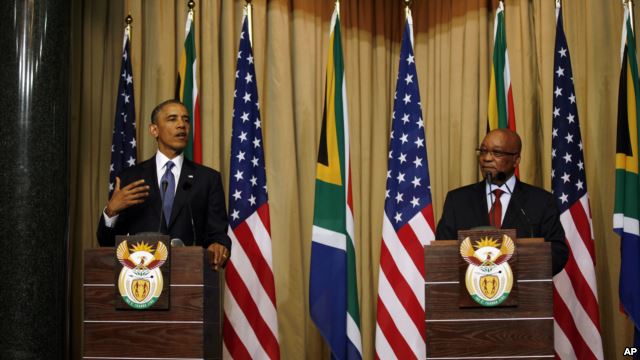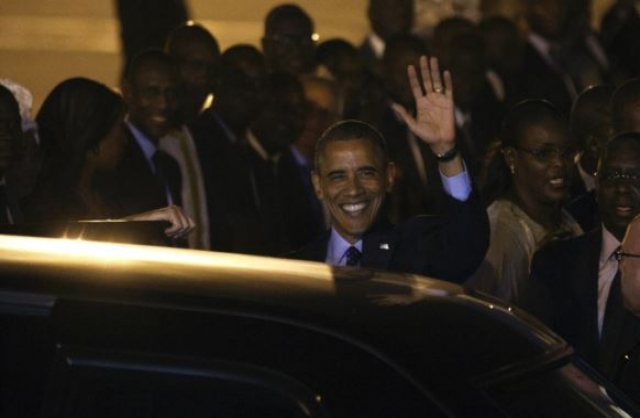 President Barack Obama and South African President Jacob Zuma address a press conference following their meeting at Union Building in Pretoria, South Africa, June 29, 2013. (Photo:VOA News/AP)
President Barack Obama and South African President Jacob Zuma address a press conference following their meeting at Union Building in Pretoria, South Africa, June 29, 2013. (Photo:VOA News/AP)
BY Dan Robinson
June 29, 2013
JOHANNESBURG — U.S. President Barack Obama engaged young people from South Africa and three other African nations for more than an hour Saturday, taking questions on issues ranging from economic growth and job opportunity in Africa to countering extremism in a town-hall style meeting that followed talks earlier in the day with President Jacob Zuma.
The condition of former South African leader Nelson Mandela was a key topic, and Obama praised the ailing anti-apartheid icon in emotional terms at both events on Saturday, saying Mandela’s personal courage and South Africa’s historic transition are a personal inspiration to him and to the world. The president will visit Robben Island in South Africa Sunday, the prison where Mandela spent nearly 20 years for fighting to overturn the country’s apartheid regime.
The president appeared at ease and energized for his exchange with the young people in his audience at the University of Johannesburg in Soweto.
Africa is “on the move,” he said, but the continent faces great challenges “that can’t be papered over.” The president said Africa’s young people will lead the way.
Watch: Video report by Dan Robinson of VOA News
“Even as too many Africans still endure tremendous hardship and great injustice, there is, as the song says, a new Africa — more prosperous, more confident — taking its place on the world stage,” he said. “And one of the reasons is because of your generation.”
Paying tribute to heroes of the anti-apartheid movement including former president Nelson Mandela and Archbishop Desmond Tutu, Obama also recalled Hector Pieterson, a boy killed by police gunfire during a protest in 1976.
“During my first visit to South Africa, I was able to go to Hector Pieterson’s memorial and pay tribute to an African boy who moved the world,” Obama said, adding that he was “humbled by the sacrifices of all who have gone before us, so we can stand here as free men and women.
“I am honored to return to Soweto now as president of the United States of America.”
What followed was a wide-ranging question and answer session with young people gathered from Kenya, Uganda and Nigeria on issues ranging from the need for accountable governments and jobs to climate change and threats from extremist groups.
One Nigerian woman asked: “Considering how long the war on terror has been on for, would you say that we are winning the war on terror, seeing as how there are new terrorist groups developing in Africa. One of which is in Africa?”
Obama said groups like Boko Haram are “doing great harm,” taking advantage of weak African governments, but that the United States is helping to build African governments’ capacity to respond to extremism.
“We want the African union and other regional organizations to build up the capacity to send in peacekeepers, to be able to nip terrorist cells that may be forming before they start and gain strength,” he said.
Answering a question from Kenya, Obama said Africans are beginning to demand accountability from their governments.
“You are starting to see more and more a norm, a standard, take hold in Africa,” he said. “And young people, I think, especially have high expectations about how government should function, and it should function for the public good, not for the benefit of just a few.”
Earlier in the day, President Obama and President Jacob Zuma discussed conflict in the Democratic Republic of Congo, the political situation in Zimbabwe and South Africa’s progress in fighting HIV/AIDS.
Zuma urged further relaxation of U.S. sanctions against Zimbabwe, and Obama said elections there scheduled for next month must be credible.
Obama said the U.S. does not feel threatened by aggressive investment in Africa by China and other countries, but he urged Africans to carefully consider what they are getting from investment partners.
Obama also praised South Africa’s role in the African Union and regional mediation efforts, and shared his vision for enhanced U.S. economic engagement and trade with Africa.
On the situation in Egypt, Obama said the U.S. is watching the situation there closely and ensuring its diplomats and facilities are protected. He called for restraint without violence.
Meets with Mandela family
President Obama did not visit ailing former president Nelson Mandela in his hospital bed, instead meeting privately with Mandela’s daughters and grandchildren. He also spoke by telephone with the 94-year-old leader’s wife, Graca Machel.
The president, his wife and their daughters fly on Sunday to Cape Town, where he will deliver a major speech expected to frame his goals of increasing investment and empowering the youth of Africa to take hold of their future.
—
Obama Praises Senegal, Calls Mandela ‘Hero for World’ (VOA News)

President Obama arrives in Senegal on Jun. 26, 2013 (VOA News/Reuters)
By Dan Robinson
June 27, 2013
DAKAR — In Senegal on the first leg of a three-nation Africa trip designed to demonstrate his re-engagement with the continent, U.S. President Barack Obama praised democratic progress made by African nations. He also spoke about former South African president Nelson Mandela.
Obama and first lady Michelle Obama were welcomed by President Macky Sall at the presidential palace.
Obama’s motorcade drove through streets lined with thousands of people holding signs welcoming the first African-American U.S. president back to the continent, reading: “Yes we can – President Obama and Macky Sall.”
One of Obama’s objectives is to recognize democratic progress in this small Muslim-majority nation, and across Africa.
Lauding Senegal’s progress
He called Senegal an inspiring example.
“Senegal is one of the most stable democracies in Africa and one of the strongest partners that we have in the region. It is moving in the right direction, with reforms to deepen democratic institutions, and as more Africans across this continent stand up and demand governments that are accountable and serve the people, I believe Senegal can be a great example.”
Obama said the world too often overlooks “amazing progress” Africa is making to improve democratic governance and empower citizens. He also mentioned Sierra Leone, Liberia, Cote d’Ivoire, Niger and Ghana.
In translated remarks, Sall praised Obama for his determination to give new energy to relations between the U.S. and Africa.
“We have a historic opportunity here to open new prospects for our relations on the basis of complementarity, by offering greater opportunities to our youth and by stimulating trade and investments for shared prosperity,” said Sall.
Answering a U.S. reporter’s question, Sall said Senegal is a tolerant country, but is still not ready to decriminalize homosexuality. He said homosexuals are not discriminated against.
Obama said the issue did not come up in their talks, but said he believes in equal treatment for all under the law.
“My basic view is that, regardless of race, regardless of religion, regardless of gender, regardless of sexual orientation, when it comes to how the law treats you, how the state treats you, the benefits the rights and the responsibilities under the law, people should be treated equally,” said Obama.
Honoring Mandela
Obama next went to Senegal’s Supreme Court, where he addressed judicial system leaders from across the West African region about the importance of the rule of law.
He also commented on 94-year-old anti-apartheid icon Mandela, who is in critical condition in a hospital.
Saying his thoughts and prayers are with Mandela and his family, Obama said Mandela’s life provided an example to the world.
“I think he is a hero for the world, and if and when he passes from this place, one thing I think we will all know is that his legacy is one that will linger on throughout the ages,” said Obama.
The rest of Obama’s schedule Thursday included a visit, with his family, to Goree Island, site of a museum dedicated to the history of the West African slave trade.
His visit there with civil society leaders reflects another major objective of underscoring the importance of empowering citizens to play a role in their governments and work to demand accountability of their leaders.
Obama’s daughters Malia and Sasha are traveling with the president and the first lady. Separately, Michelle Obama visited an all-girl’s school in Dakar named in honor of the late African-American U.S. civil rights leader Dr. Martin Luther King, Jr.
—
Related:
Obama Africa Trip Highlights Senegal, South Africa and Tanzania (TADIAS)
Obama to Discuss Trade, Investment in Africa (VOA News)
Obama’s Africa Trip to Focus on Democracy, Development (VOA News)
Join the conversation on Twitter and Facebook


























1 Response to “UPDATE: Obama in South Africa, Holds ‘Town Hall,’ Honors Mandela”